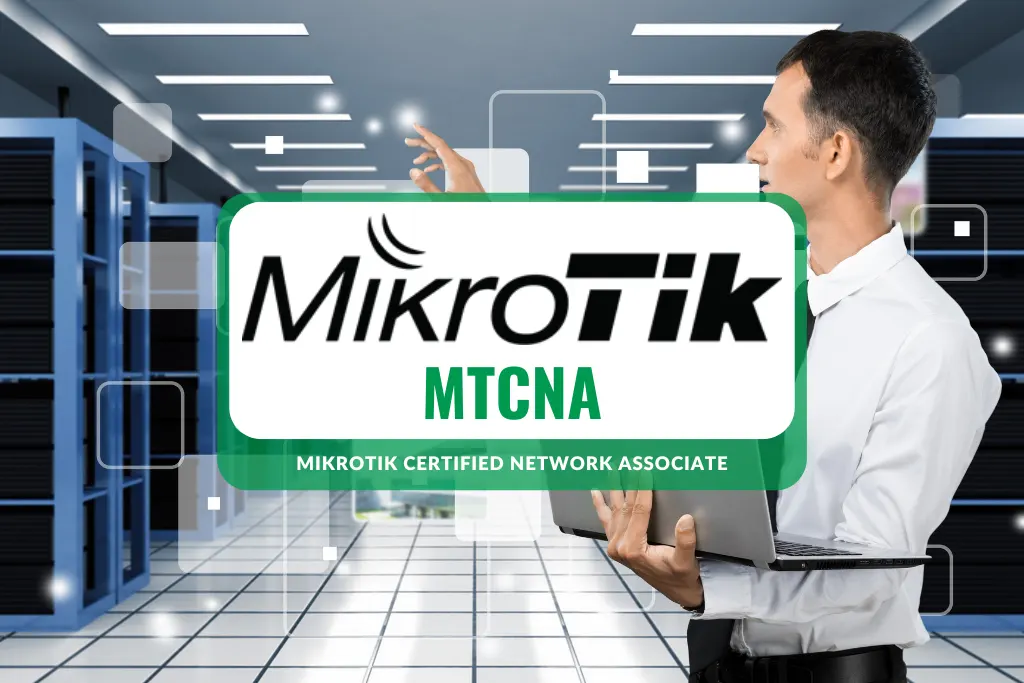Certified Network Associate (MTCNA) – merupakan sertifikat tingkat dasar pada MikroTIK. Pada track ini, peserta akan belajar melakukan konfigurasi MikroTIK RouterOS untuk dilever internet ke client, juga belajar memanage, dan basic troubleshooting (Introduction, DHCP, Bridging, Routing, Wireless, Firewall, QoS, Tunnels, Misc, laboratory).
Tujuan
Pada akhir sesi pelatihan ini, peserta akan memahami perangkat lunak RouterOS dan produk RouterBOARD serta mampu menghubungkan klien ke internet. Peserta juga akan dapat melakukan konfigurasi, manajemen, troubleshooting dasar pada router MikroTik, serta menyediakan layanan dasar kepada klien.
Pilihan kelas lain:
Durasi & Biaya
- Durasi: 3 hari (1 pertemuan 6 jam) / 18 jam
- Biaya: Rp. 2.500.000
Siapa yang seharusnya mengikuti?
Network engineers dan technicians yang ingin menerapkan dan mendukung::
- Corporate networks
- Client CPEs (WISPs and ISPs)
Prasyarat
Peserta harus memiliki pemahaman yang baik tentang TCP/IP dan subnetting.
Disarankan
- tutorial ipv4
- Uji diri Anda dengan ‘tes contoh’ di https://www.mikrotik.com/client/trainingSessions
Subject Matter
Module 1 : Introduction
- About MikroTik (What is RouterOS, What is RouterBOARD)
- First time accessing the router (WinBox and MAC-WinBox, WebFig and Quick Set, Default configuration)
- RouterOS command line interface (CLI)
- Null Modem cable,
- SSH and Telnet
- New terminal in WinBox/WebFig
- RouterOS CLI principles
- <tab>, double <tab>, “?”, navigation
- Command history and its benefits
- Initial configuration (Internet access)
- WAN DHCP-client
- LAN IP address and default gateway
- Basic Firewall – NAT masquerade
- Upgrading RouterOS
- Package types
- Ways of upgrading
- RouterBOOT firmware upgrade
- Router identity
- Manage RouterOS logins
- Manage RouterOS services
- Managing configuration backups
- Saving and restoring the backup
- Difference between a backup and an export (.rsc) file
- Editing an export file
- Resetting a RouterOS device
- Reinstalling a RouterOS device (Netinstall)
- RouterOS license levels
- Sources of additional information
- mikrotik.com
- mikrotik.com
- mikrotik.com
- Distributor and consultant support
- [email protected]
- Module 1 laboratory
Module 2 : DHCP
- DHCP server and client
- DHCP client
- DHCP server setup
- Leases management
- DHCP server network configuration
- Address Resolution Protocol (ARP)
- ARP modes
- RouterOS ARP table
- Module 2 laboratory
Module 3 : Bridging
- Bridging overview
- Bridge concepts and settings
- Creating bridges
- Adding ports to bridges
- Bridge wireless networks
- Station bridge
- Module 3 laboratory
Module 4 : Routing
- Routing overview
- Routing concepts
- Route flags
- Static routing
- Creating routes
- Setting default route
- Managing dynamic routes
- Implementing static routing in a simple network
- Module 4 laboratory
Module 5 : Wireless
- 802.11a/b/g/n/ac Concepts
- Frequencies (bands, channels) data-rates / chains (tx power, rx sensitivity, country regulations)
- Setup a simple wireless link
- Access Point configuration
- Station configuration
- Wireless Security and Encryption
- Access List
- Connect List
- Default Authenticate
- Default Forward
- WPA-PSK, WPA2-PSK
- WPS accept, WPS client
- Monitoring Tools
- Snooper
- Registration table
- Module 5 laboratory
Module 6 : Firewall
- Firewall principles
- Connection tracking and states
- Structure, chains and actions
- Firewall Filter in action
- Filter actions
- Protecting your router (input)
- Protection your customers (forward)
- Basic Address-List
- Source NAT
- Masquerade and src-nat action
- Destination NAT
- dst-nat and redirect actions
- FastTrack
- Module 6 laboratory
Module 7 : QoS
- Simple Queue
- Target
- Destinations
- Max-limit and limit-at
- Bursting
- One Simple queue for the whole network (PCQ)
- pcq-rate configuration
- pcq-limit configuration
- Module 7 laboratory
Module 8 : Tunnels
- PPP settings
- PPP profile
- PPP secret
- PPP status
- IP pool
- Creating pool
- Managing ranges
- Assigning to a service
- Secure local network
- PPPoE service-name
- PPPoE client
- PPPoE server
- Point-to-point addresses
- Secure remote networks communication
- PPTP client and PPTP server (Quick Set)
- SSTP client
- Module 8 laboratory
Module 9 : Misc
- RouterOS tools
- Netwatch
- Ping
- Traceroute
- Profiler (CPU load)
- Monitoring
- Interface traffic monitor
- Torch
- Graphs
- SNMP
- The Dude
- Contacting [email protected]
- supout.rif, autosupout.rif and viewer
- System logs, enabling debug logs
- Readable configuration (item comments and names)
- Network diagrams
- Module 9 laboratory





